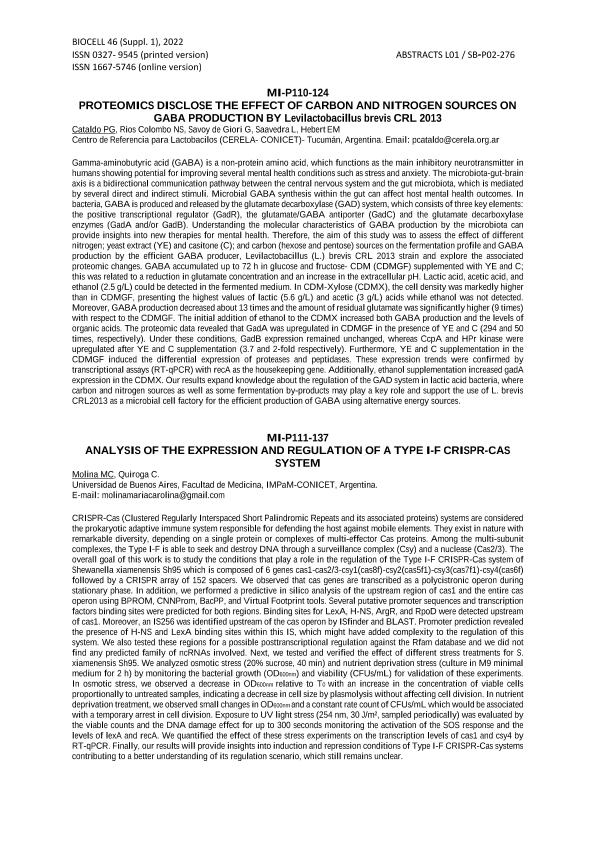Evento
Analysis of the Expression and Regulation of a Type I-F CRISPR-Cas System
Tipo del evento:
Reunión
Nombre del evento:
LVII Annual Meeting of the Argentine Society for Biochemistry and Molecular Biology Research; XVI Annual Meeting of the Argentinean Society for General Microbiology
Fecha del evento:
01/11/2021
Institución Organizadora:
Sociedad Argentina de Investigación en Bioquímica;
Sociedad Argentina en Microbiología General;
Título de la revista:
Biocell
Editorial:
Sociedad Argentina en Microbiología General
Idioma:
Inglés
Clasificación temática:
Resumen
CRISPR-Cas (Clustered Regularly Interspaced Short Palindromic Repeats and its associated proteins) systems are considered the prokaryotic adaptive immune system responsible for defending the host against mobile elements. They exist in nature with remarkable diversity, depending on a single protein or complexes of multi-effector Cas proteins. Among the multi-subunit complexes, the Type I-F is able to seek and destroy DNA through a surveillance complex (Csy) and a nuclease (Cas2/3). The overall goal of this work is to study the conditions that play a role in the regulation of the Type I-F CRISPR-Cas system of Shewanella xiamenensis Sh95 which is composed of 6 genes cas1-cas2/3-csy1(cas8f)-csy2(cas5f1)-csy3(cas7f1)-csy4(cas6f) followed by a CRISPR array of 152 spacers. We observed that cas genes transcribe as a polycistronic operon during stationary phase. In addition, we performed a predictive in silico analysis of the upstream region of cas1 and the entire cas operon using BPROM, CNNProm, BacPP, and Virtual Footprint tools. Several putative promoter sequences and transcription factors binding sites were predicted for both regions. Binding sites for LexA, H-NS, ArgR, and RpoD were detected upstream of cas1. Moreover, an IS256 was identified upstream of the cas operon by ISfinder and BLAST. Promoter prediction revealed the presence of H-NS and LexA binding sites within this IS, which might have added complexity to the regulation of this system. We also tested these regions for a possible post- transcriptional regulation against the Rfam database and we did not find any predicted family for ncRNAs involved. Next, we tested and verified the effect of different stress treatments for S. xiamenensis Sh95. We analyzed osmotic stress (20% sucrose, 40 min) and nutrient deprivation stress (culture in M9 minimal medium for 2 h) by monitoring the bacterial growth (OD600nm) and viability (CFUs/mL) for validation of these experiments. In osmotic stress, we observed a decrease in OD600nm relative to T0 with an increase in the concentration of viable cells proportionally to untreated samples, indicating a decrease in cell size by plasmolysis without affecting cell division. In nutrient deprivation treatment, we observed small changes in OD 600nm and a constant rate count of CFUs/mL which would be associated with a temporary arrest in cell division. Exposure to UV light stress (254 nm, 30 J/m², sampled periodically) was evaluated by the viable counts and the DNA damage effect for up to 300 seconds monitoring the activation of the SOS response and the levels of lexA and recA. We quantified the effect of these stress experiments on the transcription levels of cas1 and csy4 by RT-qPCR. Finally, our results will provide insights into induction and repression conditions of Type I-F CRISPR-Cas systems contributing to a better understanding of its regulation scenario, which still remains unclear.
Palabras clave:
CRISPR-CAS
,
REGULATION
,
ANTISENSE TRANSCRIPTION
,
STRESS CONDITIONS
Archivos asociados
Licencia
Identificadores
Colecciones
Eventos(IMPAM)
Eventos de INSTITUTO DE INVESTIGACIONES EN MICROBIOLOGIA Y PARASITOLOGIA MEDICA
Eventos de INSTITUTO DE INVESTIGACIONES EN MICROBIOLOGIA Y PARASITOLOGIA MEDICA
Citación
Analysis of the Expression and Regulation of a Type I-F CRISPR-Cas System; LVII Annual Meeting of the Argentine Society for Biochemistry and Molecular Biology Research; XVI Annual Meeting of the Argentinean Society for General Microbiology; Ciudad Autonoma de Buenos Aires; Argentina; 2021; 1-1
Compartir




